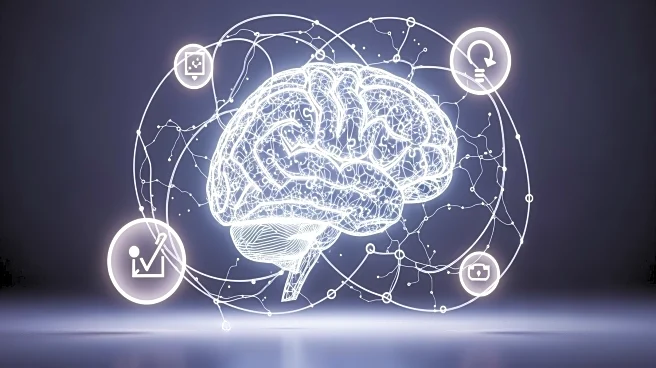What's Happening?
A recent study conducted by neurology researchers at McGill University has revealed that playing specific brain-training games can significantly improve focus and attention in older adults. Published in the
journal JMIR Serious Games, the study involved 92 participants aged 65 and above, who were divided into two groups. One group engaged in brain-training games for 30 minutes daily over a period of 10 weeks, while the other group played games purely for entertainment. The researchers utilized positron emission tomography (PET) scans and a radioactive tracer to measure the production of acetylcholine, a chemical associated with attention, in the participants' brains. Results showed a 2.3% increase in acetylcholine production in the group that played brain-training games, indicating enhanced attention capabilities. This study highlights the potential of targeted cognitive exercises to drive biological changes in the brain, particularly in the cholinergic system responsible for producing acetylcholine.
Why It's Important?
The findings of this study are significant as they suggest a non-invasive method to improve cognitive functions in older adults, a demographic often facing challenges related to attention and memory. The increase in acetylcholine production, a chemical that typically declines with age, offers a promising avenue for enhancing cognitive health and potentially delaying the onset of age-related cognitive decline. This research could influence public health strategies, encouraging the integration of brain-training exercises into daily routines for older adults. Additionally, the study's implications extend beyond older adults, as the biological changes observed could benefit younger individuals facing attention-related issues, thereby broadening the scope of cognitive enhancement strategies.
What's Next?
Following the promising results of this study, further research could explore the long-term effects of brain-training games on cognitive health across different age groups. Researchers may also investigate the specific types of games that yield the most significant improvements in attention and other cognitive functions. Additionally, there could be an increased interest in developing personalized brain-training programs tailored to individual cognitive needs, potentially integrating these exercises into therapeutic practices for conditions like ADHD. Stakeholders such as healthcare providers, cognitive scientists, and game developers might collaborate to create accessible and effective brain-training tools for widespread use.
Beyond the Headlines
The study raises important ethical considerations regarding the use of cognitive training as a tool for enhancing mental faculties. As brain-training games become more prevalent, questions about accessibility, affordability, and the potential for over-reliance on digital solutions for cognitive health may arise. Furthermore, the cultural acceptance of gaming as a legitimate form of cognitive enhancement could shift societal perceptions of video games, traditionally viewed as mere entertainment. This development might also spark discussions on the balance between digital and traditional methods of cognitive improvement, emphasizing the need for comprehensive approaches to mental health.










